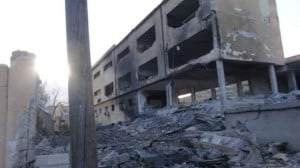By Nureddin Tulti

Tripoli, 7 October 2016:
Libya is at a major juncture; the East is on the verge of being declared free from terror, the militias and the frenzy of revolution, and the failure of schemes that seek to impose the rule of a few has become evident.
The February 17th 2011 uprising brought about the inevitable, if late coming, conclusion of an absolute dictatorship that lasted over forty years. That uprising also brought NATO’s military intervention through an air campaign that was instrumental in protecting Benghazi from an imminent onslaught, dislodging the Qaddafi government and decimating, unnecessarily in many instances, the country’s armed forces assets.
It was a job well done, after which everybody went back home congratulating themselves; the ‘‘friends of Libya’s’’ role now was to manage the country’s smooth transition to democracy.
Democracy, to the West and lesser regional financial powers and client states, meant the installation of a particular brand of moderate political Islam and led to opening the gates to more extreme ideologies.
Moderation and tolerance in religious matters had been a treasured attribute of the Libyan social fabric. The relentless effort to impose political Islam on state institutions, educational system, finance, business practices and personal code of conduct pushed society away from its cherished moderate stance, sowed discord and invited conflict and extremism.
Thus, Benghazi and Derna in particular, witnessed a relentless campaign of assassinations that targeted army and security officers, activists, journalists and members of the judiciary. The number of those murdered was in the hundreds.
Political parties were hastily formed and two legislative elections were subsequently held, producing the General National Congress (GNC) in 2012, and House of Representatives (HoR) in 2014.
The GNC was dominated by ‘revolutionaries’ and Islamists who held sway through manipulation and by intimidation carried out by sympathetic activists both inside and outside the chamber; a notable example of this was the way the infamous Political Isolation Law was passed.
The 2014 ballot box resulted, as expected, in a significant loss for the Islamists. That loss gave rise to Libya Dawn militias taking over the capital and burning down its main international airport.
HoR, faced by the prospect of falling under the threats and intimidation suffered by its predecessor, the GNC, convened in Tobruk rather than its official home, Benghazi, which was still effectively under the grip of Ansar Sharia and revolutionary formations.
That same year, 2014, saw the launch of Dignity Operation by a group of army officers headed by General Khalifa Hafter; their goal was to put an end to terror in Benghazi to start with. Hafter secured the support of the HoR and was appointed General Commander of the Libyan Army.
But Dignity Operation was up against a monumental challenge presented by the well-armed and state-financed Benghazi Revolutionaries Shura Council consisting of extremist Ansar Sharia and other revolutionary formations, allied with GNC, morally supported by the Mufti establishment and boosted by potent media coverage provided by outlets including Qatari based Al Jazeera.
Libya Dawn (mainly Misratan militias) and Dignity Operation (Eastern-based army) and their respective political backers ended up controlling Tripoli (and Misrata) and Cyrenaica respectively.
Both the GNC and the HoR failed to live up to their responsibilities at a crucial juncture in the country’s history. The HoR has been plagued by divisions, most damaging among which is the boycott of some of its members, a number of whom continue to be members of the defunct GNC or the Libya Political Agreement established State Council as the situation may demand.
Tribal influences in Tobruk and the HoR presidency have been blamed by the Islamists and the boycotters for hampering the HoR’s deliberations. While the role of the tribe in Libya is undeniable and is more conspicuous in certain parts of the country, such as Tobruk, than others, such as Tripoli, its influence on the HoR’s proceedings has been exaggerated.
Tribalism moreover, is not only a social institution; it is also an attitude to be found among the urban elite who do not tire of expressing their distaste for and rejection of such an outdated social institution.
In parallel with the military operations east and west, the UN mission, UNSMIL, launched the National Dialogue that was initially meant to bring together the GNC and HoR. This later evolved to include other parties and persons selected by UNSMIL and culminated in the signing of the Libyan Political Agreement (LPA) on December 17, 2015. The LPA, despite great effort on part of the UN Representative, US and Europe, gave rise to further discord and division.
The East considers the Presidency Council (PC) of not being truly representative geographically or politically and the HoR has so far not endorsed the proposed Government of National Accord (GNA).
The well founded suspicion that General Hafter was to be sidelined as demanded by certain domestic as well as international actors, was another extremely serious impediment to the implementation of the LPA.
Many Libyans were hopeful that the PC would succeed in lifting the country out of its misery and discord but quickly became disappointed by its dismal performance. The LPA bore the seeds of its own inoperability by failing to recognise the appropriate roles of regional, political and military actors in accordance with their proportionate respective weights. Worse, it has accentuated regional differences and fueled further discord.
The ‘national accord’, promised to be delivered by the LPA, is basically the ‘power sharing’ concept suggested by former UN representative Tarek Metri when it became clear that the Islamist parties would lose badly in the then forthcoming legislative elections.
The Islamists representation in the PC and that of their allies, coupled with their grip on many of the national institutions ever since the formation of Prime Minister Al Kib’s government in 2012, gave them a far greater weight than is commensurate with their popular support.
Another danger that confronts the nation is the all-powerful central government based in Tripoli, largely oblivious to the needs and concerns of Libyans elsewhere. People in the regions, the East in particular, are pressing for an equitable allocation of the country’s wealth and the devolution of power to regional and local levels of government.
These political and regional issues, together with corruption that has taken previously unimaginable proportions, represent the greatest threats to the country’s cohesion and continued existence as a nation. As for concern over the fate of a fledgling democracy; it is abundantly clear to Libyans as well as outsiders that although democracy has been exercised in its procedural form, its substantive core has never taken shape.
Fear of a possible restoration of military rule is uncalled-for. Qaddafi’s was not a military dictatorship; it was a dictatorship founded on tribal loyalties and a highly effective and brutal security system. Dismantling the state of fear, chaos, lawlessness, rampant corruption and terror that Libyans have endured for the past few years can only be brought about through great sacrifice. No one, except those reaping the benefits of such a system, will be sorry to see it disappear.
The Libyan National Army is close to declaring Benghazi free from terror and rule of the militias. Benghazi and the entire East, with a few local exceptions, are back to orderliness and security. This is a historic achievement that lays the foundations for gradual reconstruction and re-building of state institutions.
Danger lurks in the bigger picture. Libyans must ward off creeping partition, keep the nation alive and the country united.
Nureddin Tulti, lives in Tripoli but is originally from the eastern city of Derna which has suffered greatly from extremism and terror. He is a writer and telecommunications engineer. He has held a number of executive positions including Under-Secretary at the Secretariat of Industry, Chairman of the Electronics Industries Authority and the National Communications Company and was Country General Manager for AECOM Libya.
The views expressed in this opinion piece do not necessarily represent those of Libya Herald.







